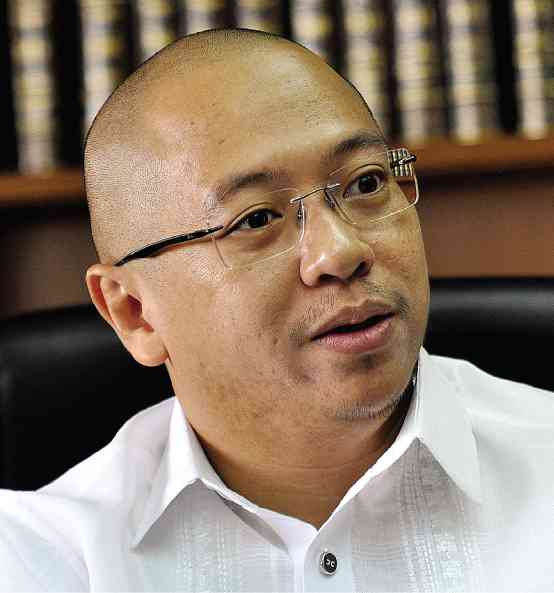SC bet Florin Hilbay defends ‘single blessedness’

‘SURFER GENERAL’ The newly named Acting Solicitor General Florin Hilbay riding the waves during one of his weekend surfing breaks in Zambales. “Floating on water,” he says, “during sunset or sunrise… It’s the closest thing to a spiritual experience.” FLORIN HILBAY’S FACEBOOK PAGE
They say a book must not be judged by its cover. But can an author—who is, no less, a candidate for Supreme Court justice—be judged by his book?
An avowed constitutionalist, Solicitor General Florin Hilbay came under grilling on Friday about his views on marriage and family which he wrote about in a book more than 10 years ago.
At the public interview session of the Judicial and Bar Council (JBC), retired Justice Angelina Sandoval-Gutierrez, the JBC executive committee chair, quoted excerpts from Hilbay’s collection of essays titled “Unplugging the Constitution” and asked him about his view that marriage should be “deregulated” and that the Family Code may well be abolished.
One of the youngest nominees
“You have unplugged the Constitution. How can you respect and obey it?” Gutierrez asked.
Hilbay, among the youngest of 16 nominees for the high court post to be vacated by retiring Associate Justice Martin Villarama Jr., had written that marriage, a time-honored institution in the Philippines, did not need to be institutionalized or legally sanctioned.
Written between 2004 and 2005 during his postgraduate law studies at Yale University, the book contains a chapter titled “Undoing Marriage,” in which he wrote: “I propose to disentangle marriage from the hold of the state by delegalizing, radically ‘disestablishing’ and ‘unbundling’ this highly popular institution.”
Gutierrez underscored that that was against the very spirit of the Constitution’s provisions on marriage and family.
“According to you, marriage is just a mere word, it should not be (required to be) legalized. That might be the reason why you are still single,” Gutierrez told the 41-year-old bachelor, prompting suppressed laughter from those in the room.
‘Not a reflection of belief in law’
“How can you defend the Constitution considering your personal views? How can you believe or obey the laws when you are doing away with the Family Code?” the retired justice said. “Maybe personal views can intertwine sometimes (with views on the law) … Don’t you find it difficult or very complicated?”
Hilbay, a professor of constitutional law and philosophy of law at the University of the Philippines, countered that such was his philosophical view, “not a reflection of my belief in the rule of law.”
Loyalty to the law
“I’m rather logically correct that purely personal aspects of relationships are beyond government confirmation. I can’t imagine a judge issuing a mandamus for a husband to love his wife,” said Hilbay, describing himself as a secular scholar.
“… I do accept the reality of marriage as a legal foundation regardless of my views. As solicitor general, I consider myself entirely faithful to the Constitution. I don’t have any right to impose any personal views I have,” said Hilbay, inviting the five-member JBC panel to consider pleadings he has written to validate his loyalty to the law.
Hilbay, the second among eight candidates to sit before the JBC on its second day of interviews, said he viewed relationships as not based on form but on substance.
“People should go beyond the form. When I look at a married couple, I get happy not because they are married but because they are in a meaningful relationship,” Hilbay said.
“It’s not the marriage that counts. It’s the quality of relationship that really matters to me.”
Some live alone
Hilbay said “people have various bases for attachment”—friendships, memberships with fraternities or sororities, for instance—while others prefer to live alone. Ultimately, there should be “no judgment on how a person lives his or her own life.”
“That is borne out of my firm belief that what really matters is the meaning that is attached to relationships, not the legal form,” Hilbay said.
He said a magistrate’s ability to separate his personal from his legal views was “a core value in the judiciary.”
“I might have different policy views over dinner conversation or coffee, but the moment I wear a particular hat, I take on a professional obligation to decide based on the facts and the law,” he said.
Gutierrez, however, could not reconcile how Hilbay could separate his personal views from how he would apply the law once chosen to join the 15-member Supreme Court.
“I still believe you will carry with you those personal views when you are appointed to the Supreme Court,” she said.
“I hope time will come that you will believe in the sanctity of marriage, and someday we’ll see that you have a spouse,” she told Hilbay.
29 years
During the interview, Hilbay was asked about his youth. If appointed, he would serve until he is 70—a total of 29 years. The Constitution requires high court justices to be at least 40 years old.
“Whereas old age can be an advantage, youth can be both an advantage and a disadvantage. In my view—of course, I’m biased—the Constitution envisions balance in the force of generations, that’s why the Constitution allows someone as young as 40 to apply,” Hilbay said in reply to a question by JBC member Menardo Guevarra.
He said someone from his generation could contribute to the Supreme Court.
‘I’m a happy person’
“The majority of the members (of the court) are in their 60s. Two members are in their 50s and no one is in his or her 40s. I think there might be some space for the court for someone as young as I am because I think my generation has something to contribute in perspective,” Hilbay said.
Retired Court of Appeals Associate Justice Aurora Santiago Lagman asked Hilbay if he would be ready to spend the next three decades of his life confined to the chambers.
“… (M)y nomination and appointment to the Supreme Court will simply be consistent with my temperament. So I wouldn’t consider it a personal disadvantage that I am able to do what I, in fact, like doing and spending the best years of my life doing what I want to do,” Hilbay said. He said he had long devoted his hours to the life of an academic—reading, researching and writing.
As to his “single blessedness,” Hilbay said, there is “no reason to be sad.”
“I can devote my entire time to my professional work, my family, music, the arts, philosophy, so I’d like to think of myself as a very happy person,” he said.
RELATED STORIES
SolGen: We’ll ask SC to junk bid on same-sex marriage in PH
New SolGen Florin Hilbay an ‘addict’ to riding the rushing waves
